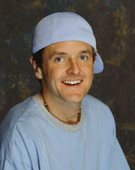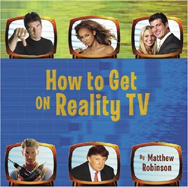October 17, 2005
FeatureGet Real: An Interview with Matthew Robinson
Ask Matthew Robinson who'd win in a fight between Jeff Probst and Donald Trump, and he answers without hesitation.
"Probst, of course. I feel like Trump's got a glass jaw. Probst could have a couple of Buffs he could strangle him with, maybe a burning torch, maybe throw some idols at him."
Sadly, we'll probably never know if he's right, but if I were a betting man I'd put my money where Robinson's mouth is. As he declares in the introduction to his book How to Get on Reality TV, "At this point, there is no one in the world who knows more about reality TV than I do." You don't argue the minutiae of Probst v. Trump with a guy who would want to claim that.
Robinson comes by his credentials honestly. His reality TV (hereinafter "realiTV") viewerhood goes back to his childhood, when he used to watch Queen for a Day, a distant ancestor of modern-day weepers like The Swan, at his mother's knee. But it was a little sleeper called The Real World: New York that really hooked him on the reality angle, and to this day he watches at least "the first couple episodes" of every new realiTV show the tube throws at us.
Every one. Think about that.
Robinson, of course, took it a step further when it came to researching the book, chasing down every realiTV producer and casting director he could find, hanging out in an American Idol audition line, sifting through discussion boards on fansites, and interviewing a number of previous cast members. If it sounds grueling, it's because it was. Sort of.
 Avoid the bars? Avoid Mike Boogie. |
"I've done really well for myself," Malin told Robinson, "but honestly, I think I could've done better without going on reality TV." Malin, the owner of successful Los Angeles restaurants Dolce, Geisha House, and The Lodge, all celebrity hotspots, may have a point. But in Robinson's experience, few cast members genuinely regret their stints in the spotlight. He even has his doubts about Amaya, whose interview reads a bit like an invective against the genre as a whole. Despite her aversion to all things involving 1999, the year she was on Real World (this includes wine bottled that year and, most distressingly, the beloved Prince anthem), he confidentially believes "she still gets a kick out of it."
These eyewitness accounts, however, weren't enough for Robinson. He kicked it up a notch by auditioning for a number of shows himself, including such diverse programs as The Apprentice, Extreme Home Makeover, and The Biggest Loser ("I'm underweight for my height," he confesses, which may help unravel the mystery of why he wasn't selected). In every instance he had no intention of going beyond the first round. All in the interest of research. "I don't have aspirations to be on a reality TV show."
Except, of course, for the one he was on. Due to a non-disclosure agreement, he's unable to reveal the name of the show or any specifics apart from the fact that it's a cable dating show. Ironically, the accumulated wisdom culled from his research wasn't a factor in being cast.
| First, unsuccessfully beg and plead with a producer friend to be cast. Then, the night before filming is set to begin, receive a 2 a.m. phone call from that producer informing you that a cast member has been arrested. Fill the void. |
(It's a bit like his casting advice for The Surreal Life: "Get famous for all the wrong reasons. Wait by phone.")
Don't bother scanning through your TiVo'd cable dating shows (you do TiVo cable dating shows, right?) looking for a guy named Matt. Robinson took an assumed name and even lied about his age. Immersed as he was in televisual reality, though, was it still enjoyable when he found himself in front of a camera instead of a TV?
"It totally was," he assures me. "It was illuminating." Robinson was fascinated with every moment of the experience, including "sitting around on a set all day and being prodded by makeup." It helped that he was already friendly with the production crew, so much so that he could make occasional requests when it came to editing — usually "Put some of my funnier jokes in there" — but Robinson, like so many others before him, doesn't feel he was accurately represented. The lesson, he says, is to go into it (if you go into it at all) cautiously, with eyes wide open.
 |
Ideally, anyway. Robinson recognizes that casts are increasingly assembled not for their propensity to cooperate, but to fight. Still, he maintains that the truly sensational shows, such as Fox's Who Wants to Marry a Millionaire? , don't have much staying power, simply because viewers quickly tire of being manipulated. Similarly, the later incarnations of Big Brother, with their overtly belligerent casts, overestimate the audience's appetite for destruction. A show like The Amazing Race, Robinson believes, succeeds not only on the strength of its suspense but also because each pair of teammates — usually spouses, friends, or family members — has a genuine connection regardless of whether the cameras are rolling. "There's no backstabbing."
One could say that Robinson, a screenwriter and novelist by day, is in the right place at the right time. "I live in L.A.," he tells me, "and you can't turn your head without finding a reality TV casting director." From what's he's seen, those casting directors aren't doing much head-turning of their own: they can work "23-hour days, half the year" putting together their various casting puzzles, each one unique, but each integral to any show's success or failure.
Robinson credits this aspect of pre-production for the success of his favorite realiTV show, the CBS juggernaut Survivor (small surprise, given his take on the fictional Probst/Trump bout). "I think they put together the best casts," he says. "It's all about building a puzzle. They put together the best puzzles." As for the cast of Survivor: Guatemala, for Robinson the jury's still out. "It's good. I haven't really grown attached to the cast members yet. I like the seasons better where the strongest get knocked off first."
Every previous season of Survivor is like a user's manual for the next, and with an virtual encyclopedia available at their fingertips — remember, these things are available on DVD — the casts just get smarter and smarter. "By now people are masters at it," Robinson says, "which makes it kind of interesting, because it's a lot harder to win."
| The problem isn't too many shows, Robinson says. It's too many of the same show: |
So what's next? Robinson laughs. He gets that a lot. "I had twelve producers tell me, 'I've got it. I'm not telling anyone about it. Wait until next year. You've never seen anything like it.'
Email the author.
Return to Season 2, Episode 3.
All written content © 2005 by the authors. For more information, contact homer@smrt-tv.com
